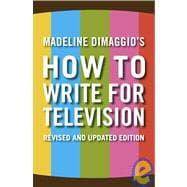
Note: Supplemental materials are not guaranteed with Rental or Used book purchases.
Purchase Benefits
What is included with this book?
| Introduction | p. 1 |
| The Story of Kevin Falls | |
| The Tools of Scriptwriting | p. 9 |
| Locales | |
| Narrative/Action | |
| Dialogue | |
| The Scene | |
| Restrictions of the Medium and How You Can Make Them Work for You | p. 33 |
| Time Limitations | |
| Characters Are Set | |
| Locales Are Set | |
| Budget Limitations | |
| The Hooks That Sell | p. 45 |
| Hook 'em Fast | |
| The Quick Setup | |
| The Star Is Pivotal | |
| Personal Involvement for the Star | |
| Twists and Turns in the Plot | |
| Powerful Act Ends | |
| A Good Runner | |
| The Button | |
| The Teaser and the Tag | |
| Thoughts to Consider Before Writing Your Spec | p. 72 |
| Writing the Half-Hour Sitcom | p. 79 |
| Comedy and Collaboration | |
| Writing Funny: Can It Be Taught? | |
| Structure: The Most Essential Element | |
| Writing the Hour Episode | p. 104 |
| The One-Hour Structure | |
| Creating Suspense | |
| The Hour Setup | |
| Build to the Act Ends | |
| Developing an Episode Step by Step | p. 116 |
| Serials and Parallel Storylines | |
| How to Create Riveting Characters | p. 122 |
| A Character's Back Life/Present Life | |
| Professional Life | |
| Personal Life | |
| Private Life | |
| The Compelling Characteristic | |
| The Television Pilot | p. 138 |
| The Pilot Concept | |
| Filling in the Concept | |
| Treatments | |
| Movies for Television and Cable | p. 149 |
| The Two-Hour Movie: The Basic Three-Act Structure | |
| The Movie of the Week: The Seven-Act Structure | |
| What Is Meant by High Concept? | |
| Developing the Two-Hour Movie | p. 230 |
| Defining the Spine | |
| Establishing the Time Frame | |
| Breaking Down the Turning Points | |
| Broadstroking the Beats | |
| Developing Character | |
| Scenes/Sequences | |
| Interior Voice | |
| First Draft | |
| Rewrites | |
| Polish | |
| Adaptations, Collaborations, and My Biggest Mistakes | p. 241 |
| Adaptations | |
| Collaborations | |
| My Biggest Mistakes | |
| A Word from Animation Writer Stan Berkowitz | |
| A Word from Reality Writer Gardner Linn | |
| So It's Written. What do I do Now? | p. 263 |
| A Word from Agent Mitchel Stein | |
| The Most Frequently Asked Questions About Marketing | p. 275 |
| A Final Note from the Author | p. 287 |
| Glossary | p. 290 |
| Resources | p. 297 |
| To Find Scripts | |
| To Buy Scripts | |
| For Networking | |
| For Links and Information | |
| Screenwriting Software | |
| Fellowships and Writing Competitions | p. 301 |
| Acknowledgments | p. 305 |
| Index | p. 307 |
| Table of Contents provided by Ingram. All Rights Reserved. |
The New copy of this book will include any supplemental materials advertised. Please check the title of the book to determine if it should include any access cards, study guides, lab manuals, CDs, etc.
The Used, Rental and eBook copies of this book are not guaranteed to include any supplemental materials. Typically, only the book itself is included. This is true even if the title states it includes any access cards, study guides, lab manuals, CDs, etc.